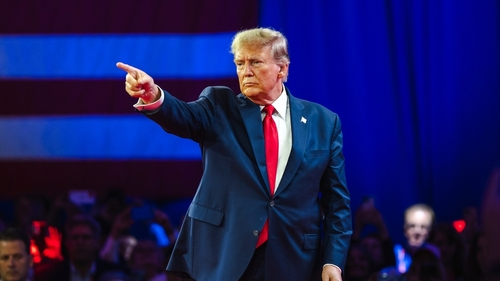Has Trump started a Trade War?
President Donald Trump's recent imposition of tariffs on key trading partners, including China, Canada, and Mexico, has reignited global trade tensions. The announcement, which includes a 10% levy on Chinese imports and 25% duties on goods from Canada and Mexico, marks a significant escalation in trade policy and has prompted strong reactions from both markets and political leaders worldwide.
With financial markets in turmoil and diplomatic channels strained, the long-term consequences of these tariffs could reshape global trade relations. This article explores the motivations behind Trump's latest trade moves, the international response, and the potential implications for the global economy.
Trump’s Justification for the Tariffs
Trump’s administration has defended the tariffs as a necessary step to protect American interests and address various challenges, including illegal immigration and the ongoing fentanyl crisis. The president also cited unfair trade imbalances as a key reason for the aggressive measures.
"We will no longer stand by while other nations exploit the American economy," Trump stated during a press conference. "These tariffs are essential for safeguarding our industries and bringing jobs back to American soil."
The administration has accused China of flooding the market with cheap goods, contributing to the opioid epidemic, and undermining US industries through unfair trade practices. Canada and Mexico, previously exempt from such aggressive tariffs under the United States-Mexico-Canada Agreement (USMCA), have been hit with duties as part of Trump's broader trade agenda.
China’s Cautious Response: Strategic Patience
China's initial reaction to the tariffs has been measured. Caught off guard during the Lunar New Year public holiday, Chinese officials pledged to lodge a complaint with the World Trade Organization (WTO) and implement "corresponding countermeasures." However, the exact nature of these countermeasures remains unclear.
Chinese state media have downplayed the immediate impact of the tariffs, instead emphasising China's resilience and preparedness. Analysts believe Beijing's tempered response is part of a broader strategy to avoid further escalation while exploring diplomatic options.
Beijing's Diplomatic Calculations
Several factors may explain China's cautious approach. First, Chinese leader Xi Jinping has maintained open communication with Trump, hoping to avoid a repeat of the 2018 trade war, which severely impacted China's economy. Second, Beijing may be banking on the possibility of future negotiations, given Trump's recent signals that he is in "deal-making mode."
China has also sought to project itself as a responsible player in global trade, contrasting with Trump's confrontational approach. "China will resolutely defend its rights but will remain committed to multilateral trade rules," said a spokesperson for the Ministry of Commerce.
Canada and Mexico Hit Hard: Swift Retaliation
While China's response has been measured, Canada and Mexico have taken a more aggressive stance. Both countries have announced immediate retaliatory tariffs on American goods, including agricultural products, manufactured goods, and consumer items.
Canada’s Response
Canadian Prime Minister Justin Trudeau condemned Trump's tariffs as "unwarranted and damaging." In a televised address, Trudeau outlined Canada's retaliatory measures, which include duties on US steel, aluminium, and agricultural products.
"We will defend Canadian jobs and industries against these unfair tariffs," Trudeau stated. "Our response will be swift, firm, and proportionate."
Mexico’s Reaction
Mexico's President Andrés Manuel López Obrador described the tariffs as "an affront to bilateral relations" and vowed to challenge them at the WTO. Mexico's response includes tariffs on US dairy products, automotive parts, and electronics.
Both countries are seeking support from other trading partners and international organisations to counter the impact of the tariffs.
Economic Fallout and Market Turbulence
Financial markets have reacted sharply to Trump's announcement. Asian shares plummeted, with Japan's Nikkei 225 dropping 2.6% and South Korea's Kospi falling 2.5%. The Canadian dollar hit a 20-year low, while the US dollar strengthened against China's yuan.
Impact on Global Supply Chains
The tariffs have raised concerns about disruptions to global supply chains, particularly in the technology and automotive sectors. Companies that rely on cross-border trade are bracing for higher costs and potential delays.
Inflationary Pressures and Higher Costs
Economists warn that the tariffs could lead to higher prices for American consumers, as companies pass on the increased costs. "These tariffs are effectively a tax on American families," said Mark Zandi, chief economist at Moody's Analytics.
Implications for the UK and Europe
The UK and European economies are not directly targeted by Trump's tariffs, but they are likely to feel the ripple effects. A slowdown in global trade could depress economic growth, while rising prices may trigger inflationary pressures.
Impact on UK Financial Markets
The FTSE 100 index is expected to see a decline, reflecting investor concerns over the broader economic implications. Higher gilt yields could increase government borrowing costs, posing a challenge for Chancellor Rachel Reeves as she seeks to maintain fiscal discipline.
Trade Relationships at Risk
The European Union has expressed concern over Trump's protectionist policies. EU Trade Commissioner Valdis Dombrovskis warned that "unilateral trade measures risk undermining global economic stability and cooperation."
Related: Tariffs Threaten to Decimate U.S. Businesses: A Crisis Looms
Related: What Is A Tariff?
Historical Context: Lessons from the 2018 Trade War
Trump's latest trade actions echo the 2018 US-China trade war, during which tariffs were imposed on hundreds of billions of dollars' worth of goods. That conflict resulted in significant economic losses for both nations and disrupted global supply chains.
Biden's Trade Legacy
The Biden administration largely maintained Trump's tariffs but shifted focus to targeted export controls on high-tech goods with military applications. This approach prompted China to impose its own controls on critical minerals and technologies.
Renewed Risks of a Trade War
Analysts warn that a renewed trade war could see China ramp up these controls, potentially disrupting global supply chains for semiconductors and other essential products.
Deal or Full-Scale Trade War?
Despite the current tensions, there may still be room for negotiation. Trump's administration has indicated a willingness to engage in talks with China and other trading partners. Diplomatic sources suggest that Beijing may be open to hosting Trump for negotiations in the coming months.
Potential Scenarios
- De-escalation through Negotiation: If both sides agree to talks, there may be a path toward a new trade deal that addresses some of Trump's concerns while avoiding further tariffs.
- Full-Scale Trade War: If negotiations fail, the conflict could escalate, with both sides imposing additional tariffs and other trade barriers.
- Global Economic Slowdown: Prolonged trade tensions could lead to a slowdown in global economic growth, affecting industries and consumers worldwide.
Conclusion
Trump's 2025 trade tariffs have once again placed global trade relations at a crossroads. While some nations have responded aggressively, others are adopting a more cautious approach. The coming weeks and months will be critical in determining whether the world will see a de-escalation of tensions or a full-blown trade war.
As the situation unfolds, businesses, policymakers, and consumers will need to navigate the uncertainties and prepare for the potential economic fallout. One thing is clear: the stakes are higher than ever in this new chapter of global trade.









